Tokyo Paralympics 2020: Indian athletes make history
- Published
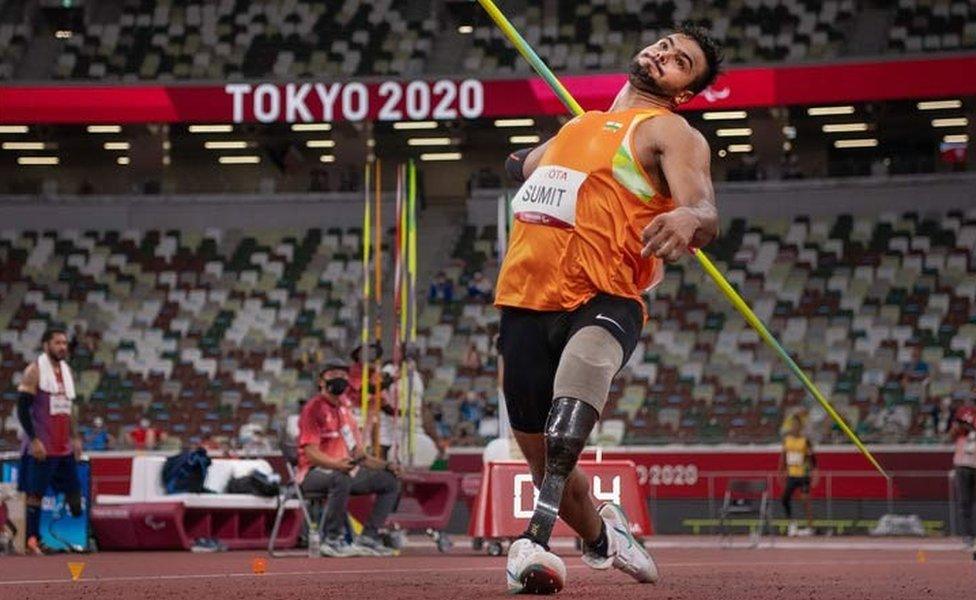
Sumit Antil won gold in the men's javelin throw
Indian athletes have scripted history at the Paralympic Games in Tokyo with their highest medal tally ever - 19.
Shooter Avani Lekhara became the first Indian woman to win two medals - a gold and a bronze - at the Paralympics.
Their previous best performance was at the 2016 Rio Games, when the contingent won four medals - two golds, one silver and one bronze.
Prime Minister Narendra Modi called it a "truly special moment for Indian sports".
India won five golds, eight silvers and six bronzes in total. And the athletes' stellar performance has won them praise and admiration on social media.
Badminton players Pramod Bhagat and Krishna Nagar won two golds in men's singles SL3 category and men's singles SH6 respectively.
Praveen Kumar won a silver medal in the men's high jump T64 with a personal best and Asian record of 2.05m.
Defending champion Mariyappan Thangavelu won a silver in the men's high jump T63 event in Tokyo, clearing the 1.86m mark.
And shooter Singhraj Adhana, 39, won the Paralympics bronze in the P1 men's 10m air pistol SH1 (lower body impairment) event where athletes do not require a shooting stand to support their pistol or rifle.
Here's a look at some of the winners from this year:
Avani Lekhara
Avani Lekhara won a bronze in women's 50m rifle 3-Positions SH1 in an exhilarating finale on Friday.
Currently ranked fifth in the women's 10m air rifle standing, Tokyo is Lekhara's maiden appearance at the Paralympic Games.
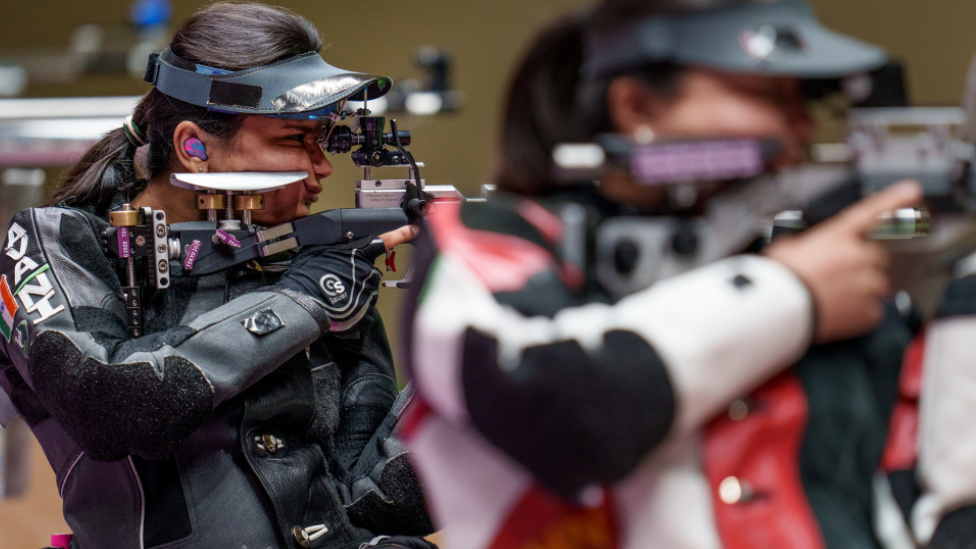
This is Avani Lekhara's maiden appearance at the Paralympic Games
This is her second medal at Tokyo - the 19-year-old won a gold with an impressive score of 149.6 in the final event of women's 10m air rifle standing. With this, Lekhara set a new Paralympic record and also equalled the world record.
A law student in the northern state of Rajasthan, she was paralysed below her waist in 2012 after a major car accident when she was 11.
It was her father who encouraged her to take up sports. The 19-year-old is also trained in archery, though shooting turned out to be her ultimate calling.
According to reports, she took up up the sport after reading the autobiography of Abhinav Bindra, who is India's first individual Olympic gold medallist.
Sumit Antil
Sumit Antil is the second Indian after Devendra Jhajharia to win a Paralympics gold in javelin throw. The 22-year-old registered a massive 68.55m to beat his own world record.
The F64 category is for athletes with a leg amputation, who compete with prosthetics in a standing position.
As a child growing up in a small village of Haryana state, Antil had always dreamt of becoming a wrestler.
But his plans came undone when his leg was amputated after a road accident in 2015. After spending months in hospital, Antil was able to walk again with a prosthetic leg. Four years later, he decided to revive his sporting journey.
Tokyo was Antil's first Paralympic. "It was not my best, I am very happy to break the world record," he told reporters after the match.
Devendra Jhajharia
Devendra Jhajharia won silver in the men's F46 javelin throw event with a personal best effort of 64.35m.
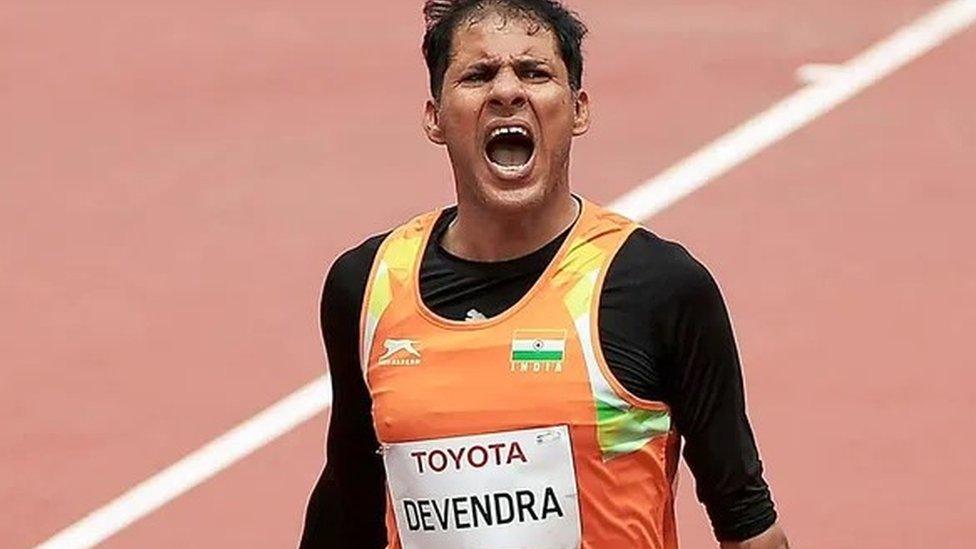
Devendra Jhajharia won silver in the men's javelin throw
The F46 classification is for athletes with arm deficiency, impaired muscle power or impaired passive range of movement in arms.
Jhajharia had won gold medals at Athens 2004 and Rio 2016, and has now become the second Indian ever to win three medals at the Paralympics after athlete Joginder Singh Bedi.
Two-time world champion, Sundar Singh Gurjar, who also participated in the event, won bronze with a throw of 64.01m.
Yogesh Kathuniya
Yogesh Kathuniya won a silver in the men's F56 discus throw event with a distance of 44.38m.
The 24 year-old finished behind Brazil's Claudiney Batista dos Santos, who set a new Paralympic record with a throw of 45.59m.
Son of an army officer, Kathuniya suffered a paralytic attack at the age of eight which left him with coordination impairments in his limbs.
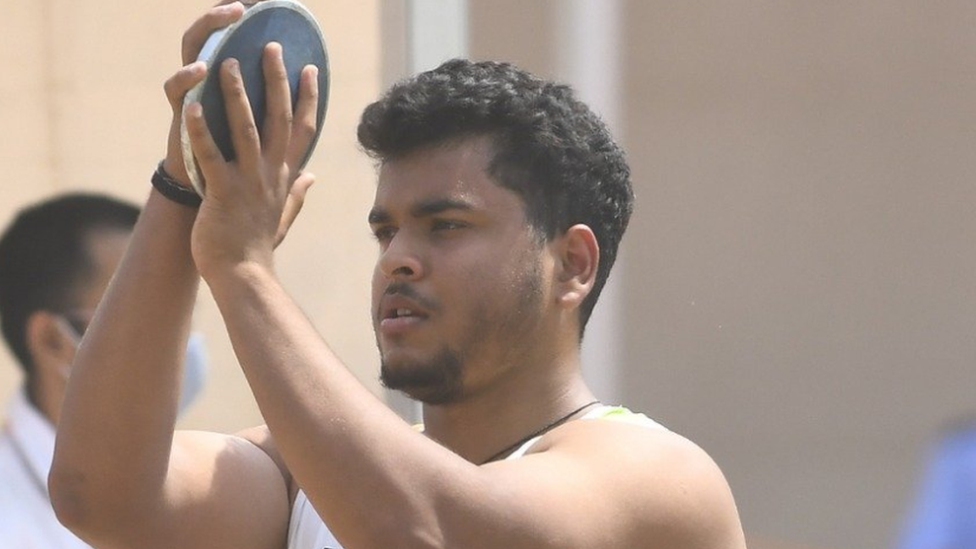
Yogesh Kathuniya registered a throw of 44.38m
In 2020, he set a world record of 45.18m to win gold at the Para-athletics Grand Prix in Berlin, which was his first international event.
Kathuniya said he felt "amazing" after winning the silver, even though the journey was far from easy.
The 24-year-old said he had to train for the Tokyo Games without a coach. "In India there was a six-month lockdown so every stadium was closed. When I could return to the stadium on a daily basis, I had to practice by myself," he told, external ESPN.
Bhavina Patel
Table tennis player Bhavina Patel won a historic silver medal in Tokyo, becoming only the second Indian female athlete after Deepa Malik to achieve the feat.
She is also the first table tennis player ever to win a medal at the Paralympics for India.
Patel, who was diagnosed with polio when she was 12 months old, lost to world number one Chinese paddler Ying Zhou in the women's singles class 4 final.
The 34-year-old said she was "extremely delighted" to win a medal but was "a bit disappointed" that she got nervous.
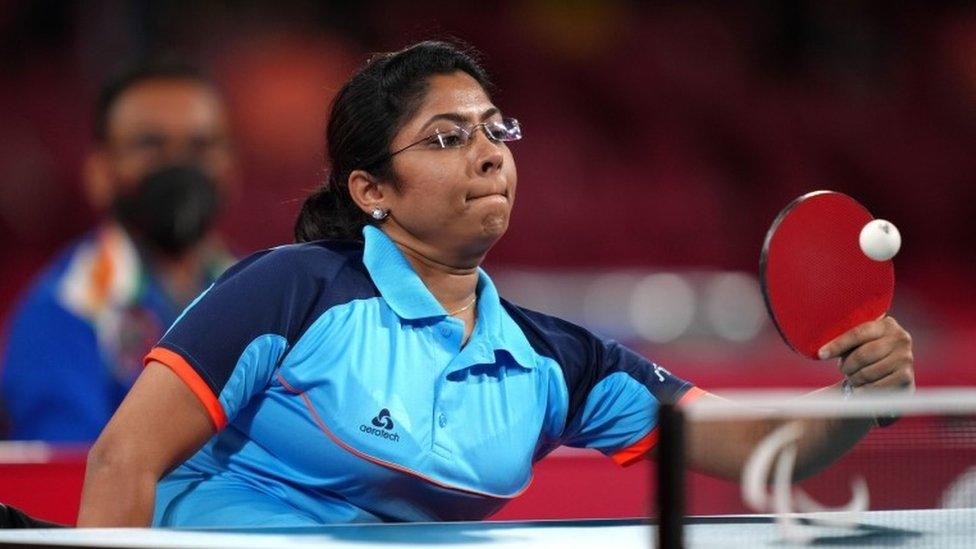
Bhavani Patel is the first table tennis player to win a medal at the Paralympics for India
However, she said she hoped her performance would help change the perception towards disabled people. "What I went through growing up, I don't want the next generation of people with disability to suffer," she said.
India is not known for being friendly towards the disabled. The community is often stigmatised and ignored. And most public places still lack basic facilities to help them in everyday life.
Nishad Kumar
Nishad Kumar claimed a silver in the men's high jump.
The 21-year-old cleared 2.06m on his second attempt to equal his own Asian record. He shares silver with American athlete Dallas Wise.
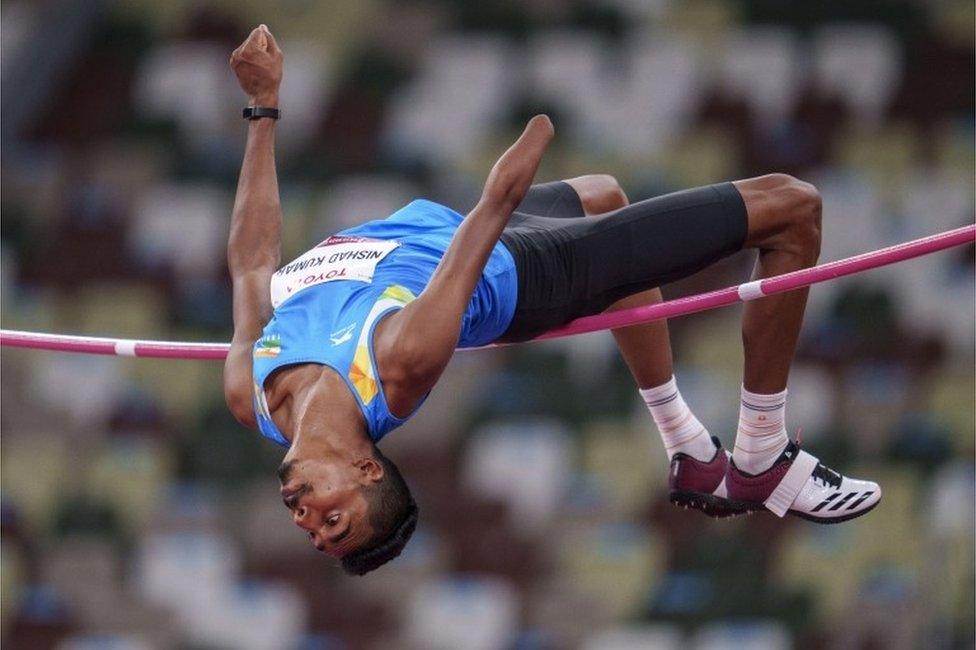
Nishad Kumar claimed a silver in the men's high jump
Son of a farmer in a small Himalayan town in Himachal Pradesh state, Kumar lost his right hand at the age of eight. He was at his father's farm, when a grass-cutting machine accidentally ran over his arm.
He had also contracted Covid-19 earlier this year while training for the Games.
Mariyappan Thangavelu
For the defending champion, who cleared 1.89m at the 2016 Paralympics in Rio and won gold, the target was now 1.90m in the men's high jump T63 event. This classification is for athletes with a leg deficiency, impaired muscle power or a lower limb deficiency.
Thangavel cleared 1.86m in his third and final attempt, touching the bar all three times.
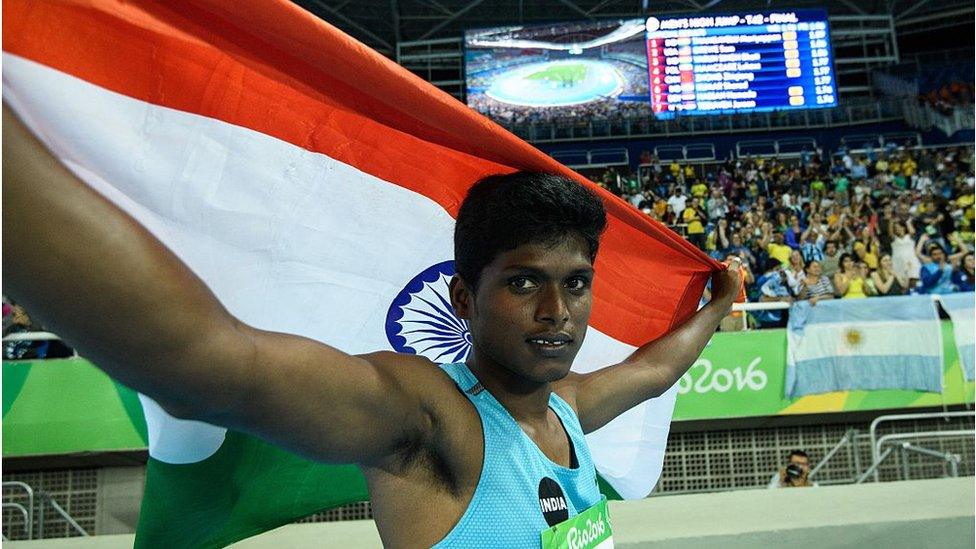
Thangavelu won a gold at the 2016 Rio Paralympics men's final high jump (T42)
He was five when a vehicle crushed his right leg in an accident, while he was on his way to school. His PE teacher introduced him to the sport. After being scouted in 2013, he took to the international stage.
In 2018 he won bronze at the Asian Para Games and picked up another bronze at the 2019 World Championships.
Sharad Kumar
After winning a bronze in Tokyo, Kumar revealed that he was injured the night before his medal-winning jump and had spent the whole night crying.
"It was very bad for me... I landed on my meniscus and that was dislocated. I did not even think that I will be able to participate," Kumar told ANI news agency during a virtual press conference.
He said he spoke to his parents the following morning and said: "I am being punished for some sin that I have done."
Allow X content?
This article contains content provided by X. We ask for your permission before anything is loaded, as they may be using cookies and other technologies. You may want to read X’s cookie policy, external and privacy policy, external before accepting. To view this content choose ‘accept and continue’.
Kumar was affected by polio at the age of two and that paralysed his left leg. But that didn't stop him. Reports say he was encouraged by his brother to take to high jump.
In 2018, he won gold at the Asiad Championships and followed it with a silver at the 2019 World Championships in Dubai.

Palak Kohli is the only Indian para-badminton player to be competing in three categories in Tokyo
